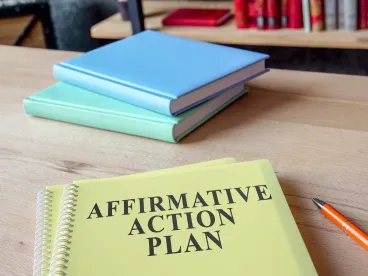On June 29, 2023, the Supreme Court of the United States held that certain race-conscious college admissions policies violate the Equal Protection Clause of the Fourteenth Amendment, which prohibits discrimination based on race. The ruling comes in a decision consolidating two cases that challenged the use of race-conscious admissions policies by private and public universities aimed at maintaining racially diverse student bodies.
Quick Hits
-
The Supreme Court held that certain affirmative action admissions policies violated the Equal Protection Clause.
The high court held that the race-conscious admissions policies at issue are unconstitutional under strict scrutiny analysis because they “lack sufficiently focused and measurable objectives warranting the use of race, unavoidably employ race in a negative manner, involve racial stereotyping, and lack meaningful end points.” The Court stated that such admissions programs have never been permitted.
The decision comes 20 years after the Supreme Court’s decision in Grutter v. Bollinger, which, along with a 1978 case, established important precedents in the realm of affirmative action in college admissions. In Grutter, the Supreme Court held that universities’ “narrowly tailored use of race in admissions decisions to further a compelling interest in obtaining the educational benefits that flow from a diverse student body” does not violate the Equal Protection Clause. The Court upheld a law school’s race-conscious admission policy in that 5-4 decision. While the case confirmed that diversity is a compelling interest in higher education, the use of race as a factor in admissions decisions was only deemed permissible under strict scrutiny as long as it is narrowly tailored to achieve the education benefits of a diverse student body. Grutter suggested that at some point such race-conscious admissions policies would no longer be necessary.
Background
The current cases were brought by a group called Students for Fair Admissions, which challenged race-conscious admissions policies at two major higher education institutions and sought to overturn the high court’s precedent in Grutter. In one of the cases, the group argued that private universities’ admissions policies that include racial preferences violate Title VI, which prohibits race discrimination by entities that receive government funding when the policies penalize Asian-American applicants, seek racial balancing, overemphasize race, and ignore race-neutral alternatives.
In the other case, the group alleged that public universities violate the Equal Protection Clause of the Fourteenth Amendment, which prohibits government entities from discrimination based on race, when they reject race-neutral admissions alternatives because they would change the makeup of the student body without proving that the alternatives would harm the academic quality or educational benefits of a diverse student body.
The Decision
In the opinion of the court, Chief Justice John Roberts held that the programs at issue “cannot be reconciled with the guarantees of the Equal Protection Clause” because of their focus on race. However, Chief Justice Roberts stated that the decision should not be “construed as prohibiting universities from considering an applicant’s discussion of how race affected his or her life, be it through discrimination, inspiration, or otherwise.” Still, an applicant “must be treated based on his or her experiences as an individual—not on the basis of race.”
For example, Justice Roberts stated that “a benefit to a student who overcame racial discrimination … must be tied to that student’s courage and determination” and “a benefit to a student whose heritage or culture motivated him or her to assume a leadership role or attain a particular goal must be tied to that student’s unique ability to contribute to the university.”
Justice Sonia Sotomayor, along with justices Elena Kagan and Ketanji Brown Jackson, expressed dissent in a comprehensive opinion spanning nearly 70 pages, asserting that the conservative majority of the court is “further entrenching racial inequality in education” through its decision.
Justice Sotomayor cited the Fourteenth Amendment’s Equal Protection Clause and contended that the amendment’s commitment to racial equality can be upheld by employing “race-conscious means in a society that is not, and has never been, colorblind.”
According to Sotomayor’s argument, the court’s invalidation of affirmative action policies “cements a superficial rule of colorblindness as a constitutional principle in an endemically segregated society where race has always mattered and continues to matter.” She suggests that this approach perpetuates and exacerbates existing disparities rather than addressing them.
This ruling has significant implications, as it will likely compel numerous U.S. colleges and universities to reevaluate and revise their admissions policies to comply with the Court’s decision. The impact of this decision on future diversity efforts in higher education and beyond remains to be seen.






 />i
/>i

